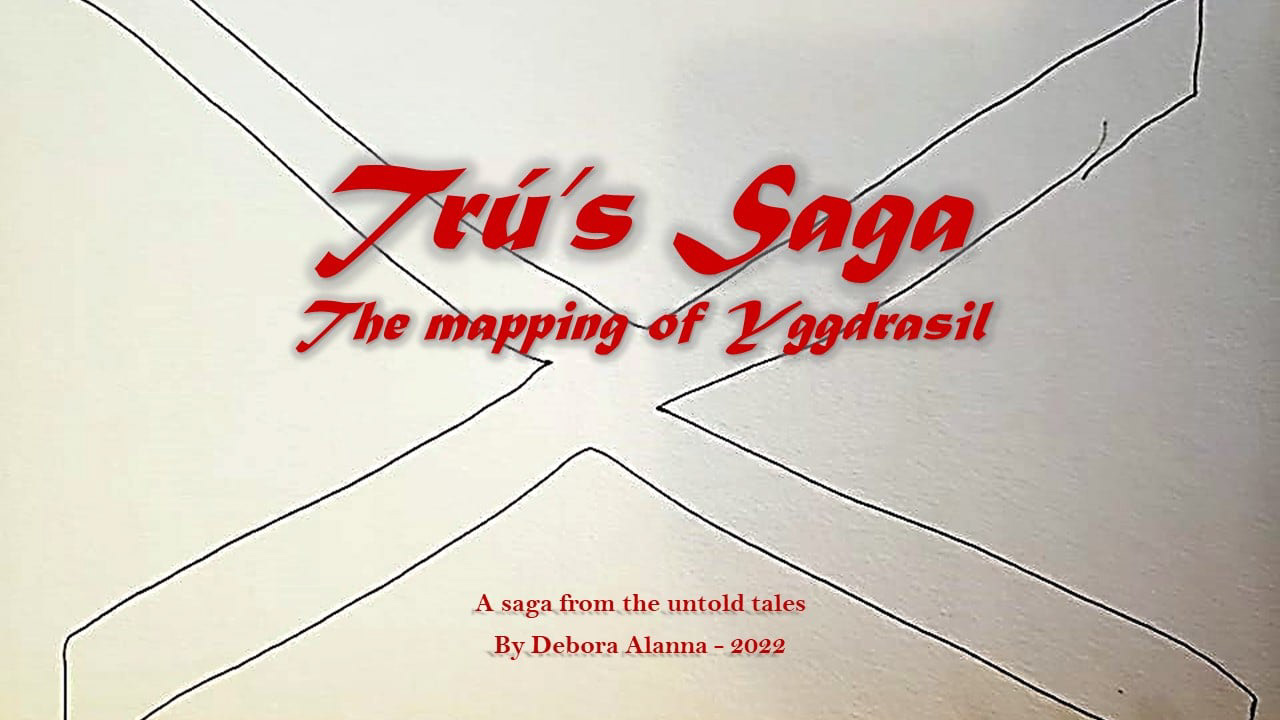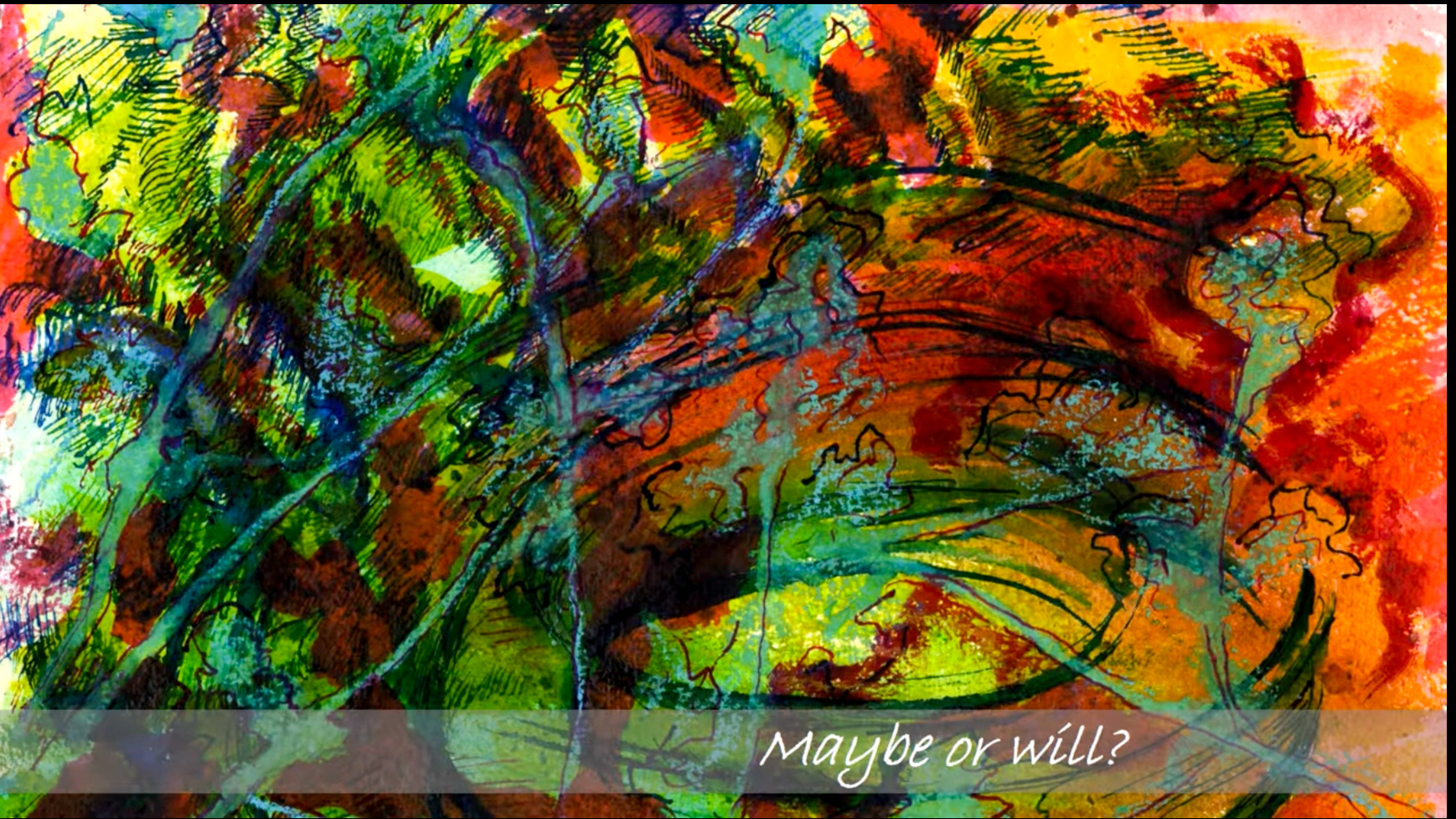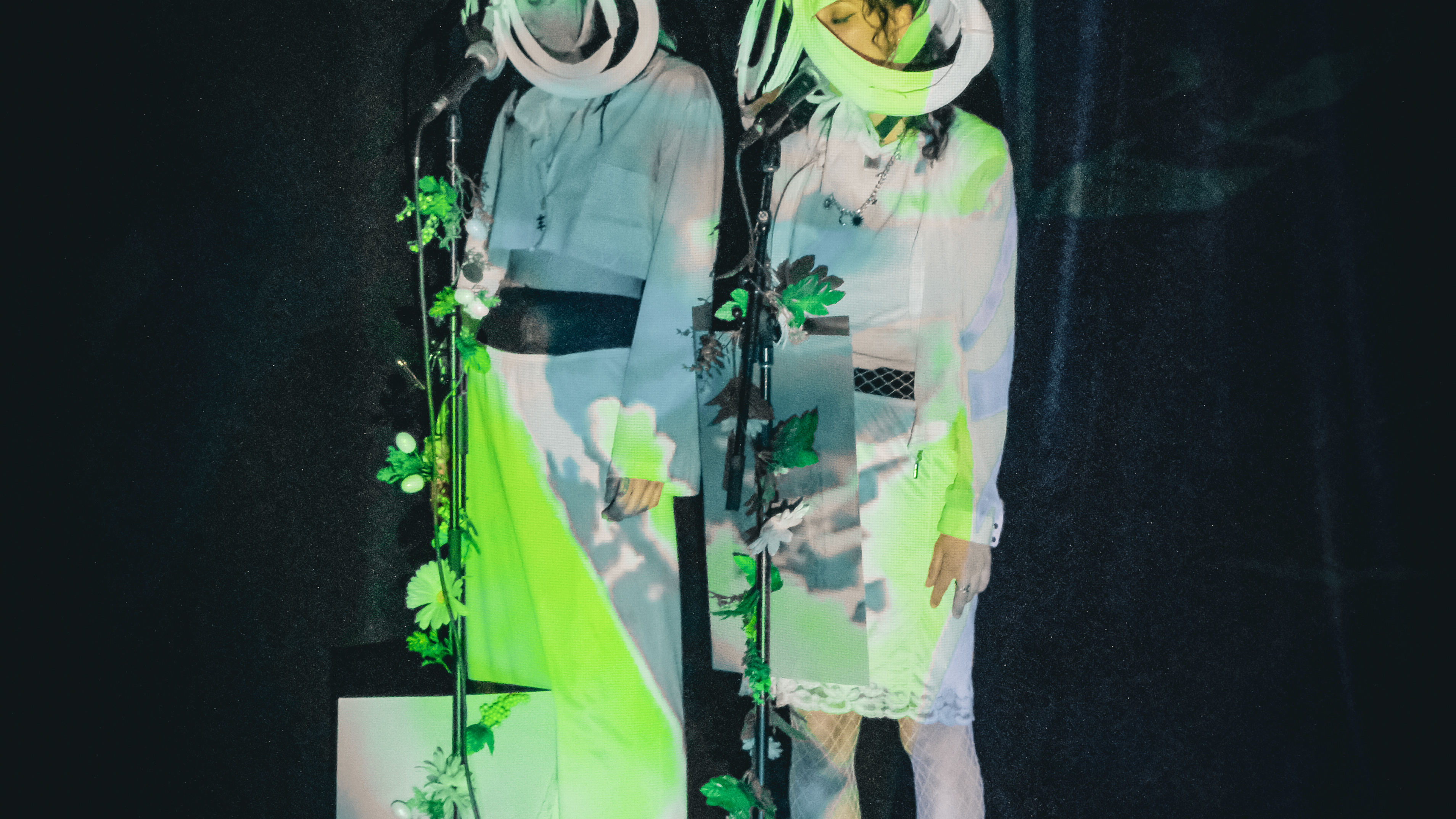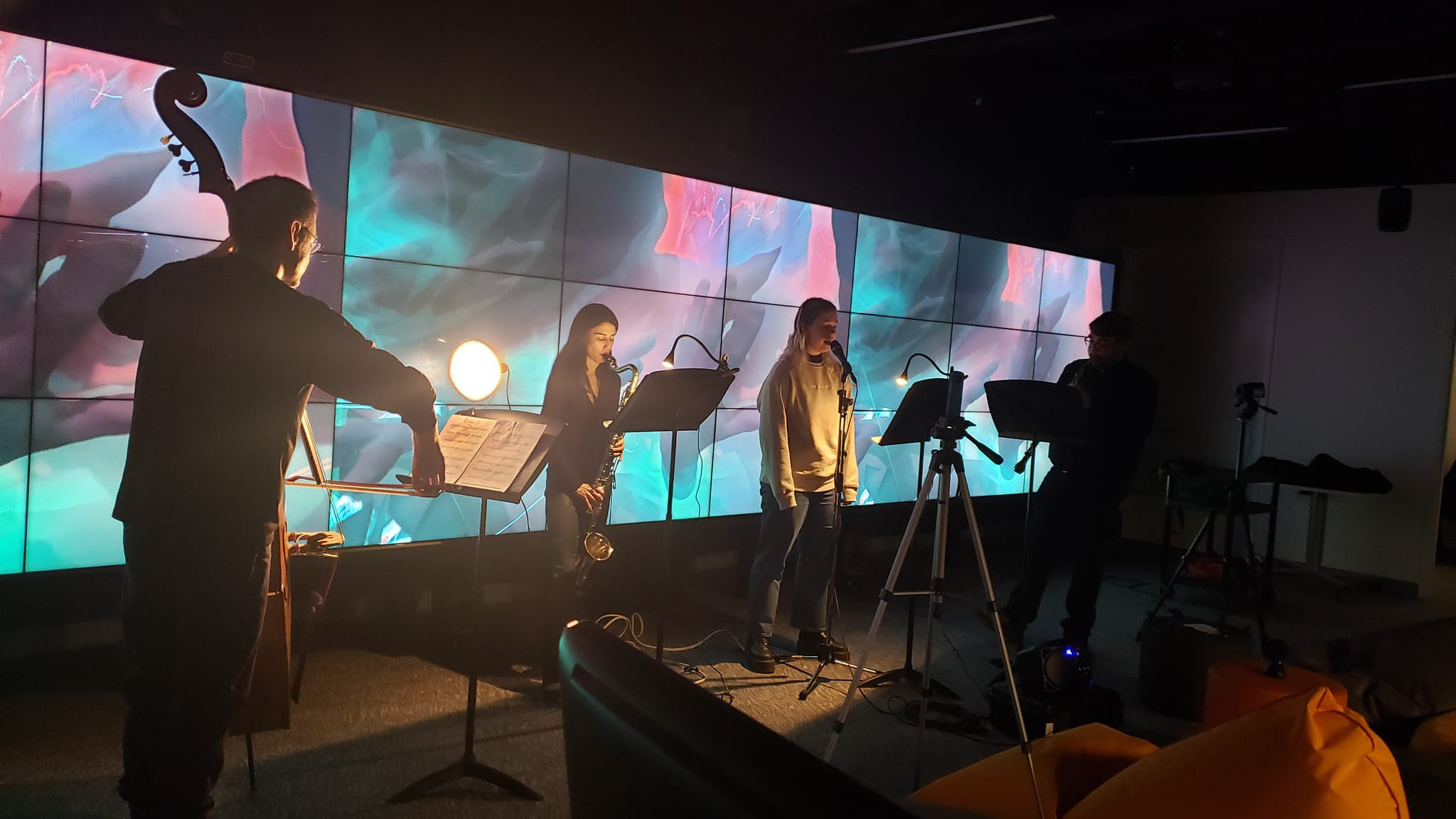"The Well" Audio book
Pablo's Demoiselle with Vilborg's Raven (2015)
Osculation – a Trú and Vilborg tale.
(A tale from the Trú and Vilborg saga)
By Debora Alanna
15 December 2023
In the previous episode…
Trú, a man, a crofter, had been trapped in a raven’s body by the deity, Loki. A Húldufolk, one of the hidden people in Iceland, a human-like creature that can be seen only if they want to be seen, demanded that Loki judge a dispute between neighbours, himself and Trú. Trú’s ceramic kiln, unintentionally positioned on the Húldufolk hill dwelling, impaired the creature’s life in his hillside abode. But worse than this imposition, his use of the hill as a kiln site came from the Luthern pastor. For a Húldufolk, this transaction was detrimental to their essence, and ruinous to their lives within the hillside. Húldufolk wouldn’t have minded smoke from the kiln but electricity or Christianity really bothers them. This story occurred before electricity, so it is a story that documents the wrath of the Húldufolk against the infiltration of Christianity.
Moreover, Loki deemed that Trú was cruel to the Huldefolk because he should have forethought the kiln smoke imposition. Trú should have declined the use of the hillside, as the pastor assumed his authority; permission from the Húldufolk was essential. Trú said that Loki was as dumb as a raven (ravens aren’t dumb) to think he could see what was hidden from him without the Huldefolk’s intent. Loki transformed Trú into a raven as punishment for what he deemed was obnoxious behaviour, and especially because his nasty chide was associated with the birds of Odin, the ravens, Hugin and Munin. Transfigured, he learned to caw, out of necessity to interact with other ravens. He poked his beak into dirt, between sand granules, to find sustenance. He was forced to live a raven’s life.
However, Trú remains human in a raven’s body. He can maintain his friendship with Vilborg, once his neighbour, because he continues to speak human. But this friendship is limited by Trú’s raven existence.
…
Hours before dawn, midsummer of June 1823, above Reynisfjara Beach on Iceland’s South coast, Trú heard his friend, Vilborg’s cry from his perch in the basalt caverns.
Several minutes earlier, Vilborg whispered out loud, speaking to no one in her vicinity. No one was around.
“Solstice.” Solstice was more than a seasonal event. Solstice was a presence.
Vilborg waited for Solstice to answer. Only the Solstice feeling and its fruition sensation enveloped Vilborg as reverie.
“Can she hear my voice, Solstice?” She stood erect, her arms stretching to the sky. She waited for a response. Desolate, Vilborg cupped her throbbing breasts, then pressed her damp palm to her face to smell the leaking sweetness. She kissed the centre of her hands, one, then the other.
Waves crashed, one upon another, deadening any audible Solstice reciprocity.
Katla cannot hear my voice. She looked up to watch the approaching sky formations, a collection of three bright pink fluffy clouds, a canopy over her head. Under her fish skin shoes, the black sand shore, ground whits of ancient lava spills near her village, Vík, was convulsing from the rumbling of nearby Katla, the volcano, growing louder in its veracity.
No eruptions. Only my blood flows. She sat down on the shadowy gravel near the killer wave line, watching the shore waters quiver after each wave crashed and collapsed, receding into the ocean. The waves, true to form, were grand, enormous arms, the arms that ancestors warned would seize all that was left aground before them. She was close enough to be in the wave trough aftermath but not too close that she would be taken by their crests.
Her lips, too, trembled as she hummed, “Sofðu unga ástin mín” (Sleep my darling), sung through the ages upon their children’s release into the brink. Her new skirt, crafted from the April spring lamb shearing bounty, was stained with a red lake of blood in the middle of its symmetrical gore lines between where her knees met her torso. Her knees now protruded into the blood stain as she sat, allowing encroaching North Atlantic wave trails to soak up into her dress. Gradually, waves awakened to her presence. Progressively, breakers increased their force, although Vilborg was not yet inundated with effusive pummeling. Soon.
The giant waves are nearing. They are a Solstice sign, a Húldufolk sign – an end with a new beginning.
The ocean water drifting towards her after their waves’ crest fall rushes began its occasional dousing but would not wash her skirt clean. Its fibres were now laden, heavy with the indifferent Atlantic melded with a bloody tale. The skirt’s sodden body, released from its substantiality, clung to her ankles. She shifted her bottom into the dark sand, held her knees tight, and kissed her middle knuckle, chewed it raw, rocking herself as she lapped the new blood. Her thick knitted peysa, or sweater with the Hrauneyjar spring run-off rivulets’ pattern, could not protect her from the ocean’s strike sprays, although doubled up with her woolly camisole. She shivered as a demonstrative wind moaned, its meandering extremities of cold air reaching her through her soaked peysa’s protection.
Abruptly, disrupting the wind’s manipulation, Vilborg emits one long, piercing cry. She rasped the morning like a caw. Just one. A howling caw. This caw-like cry alerted Trú. Vilborg’s cry shook him out of slumber, out of his basalt cover. He flew to her as fast as may be. Vilborg could not determine if it was seconds, minutes or more. Time was heavier, and she was disoriented with cold. Moments weighed on her, compressing Vilborg.
It’s too quiet. She began to sing words from the lullaby: “Peaceful be your slumbers deep.”
Vilborg watched Trú soar through the pink clouds and descend. Once his claws met the sand, he stepped as close to her as possible, wanting to touch her. His feathers stroked her skirt.
“What’s that you are singing, Vilborg?” Trú and Vilborg had been friends for many seasons.
“I heard your voice all the way up to my perch on the escarpment!”
“I thought I was humming.” She watched the notorious waves pelt the shore.
“Oh, yes. I was singing. You heard me?”
“Your voice pierced the air. What’s wrong?”
“Wrong?” Vilborg’s gravelly voice ebbed as she repeated, “Wrong.”
His perch near Vilborg's beach had been a brief flight to her, her black sand voice.
“I tried to come to you as quickly as I could.”
Through Trú’s raven’s eyes, Vilborg’s face now seemed to be leaking. However, he knew what tears were. Wanting to console, Trú hopped onto Vilborg’s shoulder. He could not hug her, hold her. Disconsolate, he flapped his wings. His frustration slapped her ear.
“Trú!” Her admonishment bit him. He jumped off.
Vilborg began pounding her knuckles on her temples.
Trú squawked, “No, don’t do that, Vilborg.”
Instead, she opened her palms and made circular motions into the sand, spreading her fingers. Trú almost got caught in this curve of emotional release and hopped beyond her fingers’ reach.
“Wrong?” Vilborg asked stridently, thinking, I speak like a jökulhlaup (glacier burst). Am I becoming glacial?
She began rocking herself in some unrhythmic undulation, arms crossed, hugging herself, swaying.
I need to break the ice.
“Tell me.” He stepped close enough to stroke Vilborg’s wet garbed leg with his wing feathers. Vilborg stopped her rocking. She riveted to his care, fastening her gaze on Trú’s eyes.
“Remember when we were together last autumn?”
“I was still in a man’s body then, if you mean, our last time together, just before the snows. I will never forget that night, our last kiss.”
That afternoon, Loki had cursed him. That night, Loki’s curse had not yet transformed him. In the morning, he awakened a raven.
“Well, we were blessed with a child from that union.”
“A child? What child? Where’s the child?”
Trú, now fully realising what Vilborg was saying, stung the air with his caw of pain.
Unable to contain his despair, he lofted and bellowed at Loki. “Wherever you may be, that’s a curse for you, Loki - that sound will hurt you if you can feel my cry for our child.”
Trú descended to witness Vilborg’s features diminishing. Her internal light was dimming. She darkened, as dark as the sand.
“Vilborg, you are becoming spectral. You are reintegrating into nature.”
Gathering worried thoughts faster than the invading waves, helpless, he peered at the stone faces, mountains of people captured in stone near the beach and beyond.
Vilborg faced Trú. She extended her hand to her friend, and he grasped her wraithlike fingers with his claws. Vilborg brought Trú’s bird body up to her lips. She caressed the side of his beak with her lips as cascades of tears fell. His tongue licked some tears as if he was thirsty for her pain as if her tears would quench his longing.
“Where’s our child, Vilborg?”
“Gone.” She gasped for air that seemed to be drifting away.
“Gone where?”
“I kissed her goodbye.”
Trú hopped onto the blood stain. His claws now wore blood, the birth blood of their child. He plunged his beak between the weft and the weave of Vilborg’s skirt to kiss his child’s blood.
Volcanic ash fog was infiltrating the pink. Katla rumbled.
“That’s our daughter, telling us she is now in nature,” Trú explained.
“Katla. That’s her name. Katla.”
Ash, grey petals drifting from the volcano fell on them.
“Katla,” Trú echoed. Grey smudges mottled his feathers.
Vilborg rose to the eclipsed morning sun, a hole in the sky through the ash haze. Ash whorls gathered on her eyes as she stopped trying to brush them away; her hair wore a grey petals’ shroud.
Trú flapped his wings vigorously, hovering at Vilborg’s side as she glided out to the ocean’s heaving. One ocean surge, cresting, collapsed over her head. So far, it was not strong enough to capture her.
As Vilborg walked towards the inevitable, he called, “Vilborg. Vilborg! Don’t leave, too, Vilborg.”
She stopped walking. The waves withdrew, waiting for their farewell. She stroked his feathers as he hovered like a shadow beside her. She pressed her lips into his feathers’ gloss. Trú nuzzled her neck before she released herself from this near kiss.
Again, Trú cawed an airborne ill directed at Loki, more raucous than the volcano’s roar. Although in Asgard, the realm of the gods, Loki caught this shriek. This cry was followed by all Vilborg and Trú’s wails, timeless, compressed, and amassed into a sonic goring instrument of their combined grief. Their sorrow was a projectile that released Trú from Loki’s influence.
Too late.
Trú, the man, as a man, stood on the shore where Vilborg stood moments before, before the wave – the upsurge that collected her.
Trú stood alone.
Katla erupted, spewing lava that gathered the impressions of those lost on Reynisfjara Beach.
Trú fell to his knees and pressed his face into the shore.
The wave kissed Trú.
…
The basalt columns at Reynisfjara are a Húldufolk temple, more powerful than the previous hill where Trú’s kiln was situated. That’s why the waves take people now and then as human sacrifice.
Vilborg’s offering of her baby appeased Húldufolk. Loki noticed. However, Loki transformed Trú from a man to a raven, then back to a man because of Trú’s remorse.
…
“Vilborg sacrificed herself at the basalt cliff beach,” Loki said to the Húldufolk at the hill near Trú’s croft after Trú returned home.
…
“Vilborg sacrificed herself at the basalt cliff beach,” Loki said to the Húldufolk at the hill near Trú’s croft after Trú returned home.
“She did,” the Húldufolk said. “For that, she is in my abode in the hill - waiting for me now.”
~
The end of the Osculation tale.




